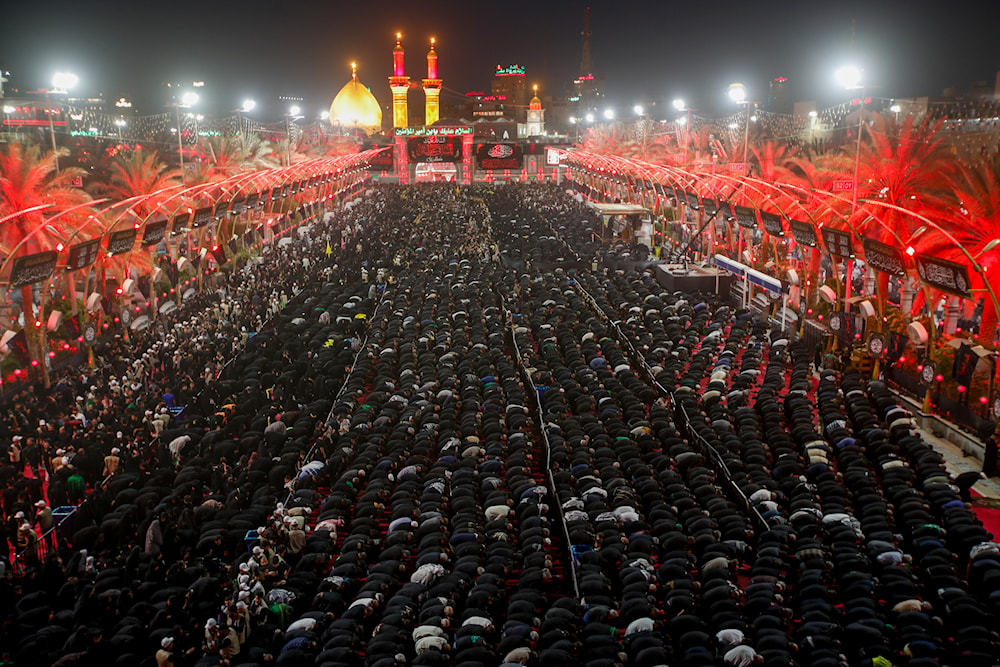The world commemorates Ashura
Ashura processions around the world honor Imam Hussein, the grandson of Prophet Mohammad, whose martyrdom at Karbala remains a powerful symbol of revolution and sacrifice across generations.
-

Muslims from around the world take part in Ashura that marks the martyrdom of Hussain ibn Ali, a grandson of the Islamic prophet Muhammad, and members of his immediate family in the Battle of Karbala, in Karbala, Iraq, Monday, Aug. 8, 2022 (AP)
Mass commemorations for the 10th of Muharram, Ashura, the day that marks the martyrdom of Prophet Muhammad's grandson, Imam Hussein ibn Ali, were held on Sunday all around the world.
The annual rituals, deeply rooted in resistance and sacrifice, pay tribute to Imam Hussein’s defiant stand against tyranny in the historic Battle of Karbala more than 1,300 years ago.
Imam Hussein’s revolt, though tragically ending in his martyrdom, has remained a symbol of unwavering justice and moral resistance in the face of oppression. Today, across cities from Beirut to Kashmir, mourners revived his memory with processions, sermons, and symbolic acts of mourning, reflecting a profound spiritual and political legacy that continues to inspire generations.
Lebanon: Marches of loyalty amid ongoing Israeli aggression
In Lebanon, thousands of mourners poured into the Sayyed al-Shuhada Complex and the surrounding streets of Dahiyeh, the southern suburb of Beirut. The main Ashura march progressed toward the Kafaat area, where Hezbollah Secretary-General Sheikh Naim Qassem delivered a speech echoing the values of Imam Hussein and the recent developments in the region.
Ashura this year carried a deeper sorrow, as it marked the first commemoration since the martyrdom of Hezbollah Secretary-General Sayyed Hassan Nasrallah, who was assassinated by "Israel" in a series of massive strikes.
انطلاق مراسم إحياء اليوم العاشر من محرّم في المجلس المركزي الذي يقيمه #حزب_الله في مجمّع سيّد الشهداء في الضاحية الجنوبية لبيروت.
— الميادين لبنان (@mayadeenlebanon) July 6, 2025
مراسل #الميادين عباس الصباغ ينقل المشهد من هناك👇#لبنان #الميادين_لبنان @abbas_sabbagh pic.twitter.com/0n5t9wAZxL
For decades, people around the world had turned to Sayyed Nasrallah’s Ashura address as a moment of spiritual clarity and political resolve. His speeches were not merely rhetorical events; they were compasses of truth, resistance, and steadfastness, guiding the faithful through the trials of their time. His absence reverberated profoundly across the global consciousness.
Massive crowds join the Ashura procession in Beirut’s southern suburb.
— PressTV Extra (@PresstvExtra) July 6, 2025
Follow: https://t.co/7Dg3b41PJ5 pic.twitter.com/E11xnIQxIJ
This Ashura, mourners grieved not only for Imam Hussein’s timeless sacrifice at Karbala, but also for a contemporary voice of resistance; a leader whose life and martyrdom echoed Imam Hussein’s defiance in the face of tyranny. His memory lived on in every tear, every chest beat, and every cry of “Labayka ya Nasrallah!”; a vow that his message endures beyond death.
Parallel commemorations unfolded across the south and Bekaa Valley, including in border towns such as Kfar Kila, where processions moved solemnly past buildings bearing the scars of recent Israeli occupation strikes. The juxtaposition of grief for Karbala and defiance in the face of occupation created a powerful atmosphere of resistance and remembrance amid ongoing Israeli violations of the ceasefire.
Iraq: Karbala and Najaf welcoming millions
In Iraq, the spiritual heartland of Ashura, massive crowds filled the holy cities of Karbala and Najaf. According to Iraq’s Interior Ministry, over 1.17 million pilgrims have entered the sacred shrines since the start of Muharram. 833 mourning processions were officially registered in Karbala alone, including delegations from 10 foreign countries, a testament to the global resonance of Imam Hussein’s sacrifice.
Authorities deployed civil defense teams throughout the historic old city, ensuring safety as throngs of mourners filled the streets, invoking the cry that still echoes through time: "Labayka ya Hussein!"—Here I am, O Hussein.
Iran: From grief to defiance in the wake of aggression
In Iran, cities and towns across the country witnessed massive Ashura gatherings, infused this year with a deeper tone of resistance following the latest Israeli aggression. Al Mayadeen’s correspondent noted that the processions, often marked by black flags of mourning, instead featured Iranian national flags, underscoring national unity under the banner of Imam Hussein’s message.
On the day of Ashura, all mourning groups in Bandar Abbas march through the city’s streets, carrying flags, their chants punctuated by the rhythmic beats of cymbals and drums. They later gather in one location to perform the Ashura noon prayer together. pic.twitter.com/79qYqdjux3
— IRNA News Agency (@IrnaEnglish) July 6, 2025
The slogan for this year’s ceremonies—“Iran of Hussein, victorious forever”—captured the enduring belief that Imam Hussein’s path of justice ultimately leads to triumph, even if paved by martyrdom.
Pakistan and Kashmir: Floating Resistance and grounded devotion
In Pakistan, tens of thousands joined processions in Karachi’s Nishter Park, as tight security surrounded the country’s Ashura events.
Kashmiris attended a mourning ceremony on the eve of Ashura to commemorate Imam Hussein and his companions, who were tragically martyred in the Battle of Karbala.
— Press TV 🔻 (@PressTV) July 6, 2025
Follow: https://t.co/mLGcUTS2ei pic.twitter.com/3TVn560iB5
Meanwhile, in Indian-controlled Kashmir, where political repression remains high, mourners observed the 9th of Muharram with floating processions on wooden boats across Dal Lake, a poetic act of devotion navigating waters long associated with cultural resistance.
Across Europe, the US, Australia, and parts of Africa, communities also commemorated Ashura with solemn processions, majlis gatherings, and symbolic acts of mourning.
From London to Dearborn, Sydney to Johannesburg, mourners gathered in mosques and community centers, reciting elegies and reenacting the tragedy of Karbala.
Despite being far from the shrines of Najaf and Karbala, the spirit of Imam Hussein’s sacrifice resonated deeply, transcending borders and uniting believers in their shared grief and unwavering commitment to justice. In every corner of the diaspora, Ashura served as both a spiritual anchor and a reaffirmation of resistance against oppression in all its forms.
These commemorations highlight the resilience of oppressed communities worldwide, invoking Imam Hussein’s memory as a beacon of moral defiance.

 5 Min Read
5 Min Read










